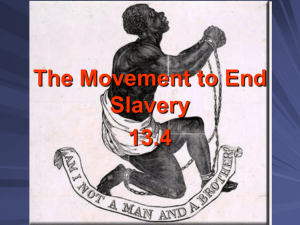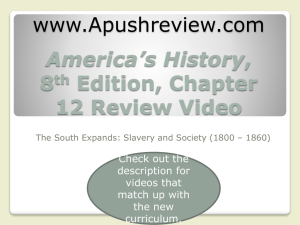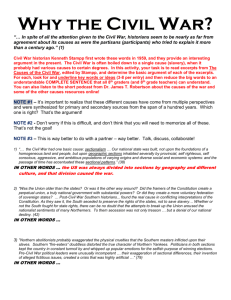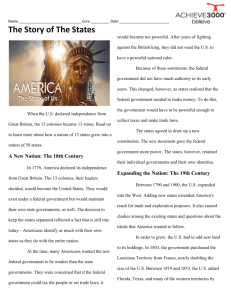File
advertisement
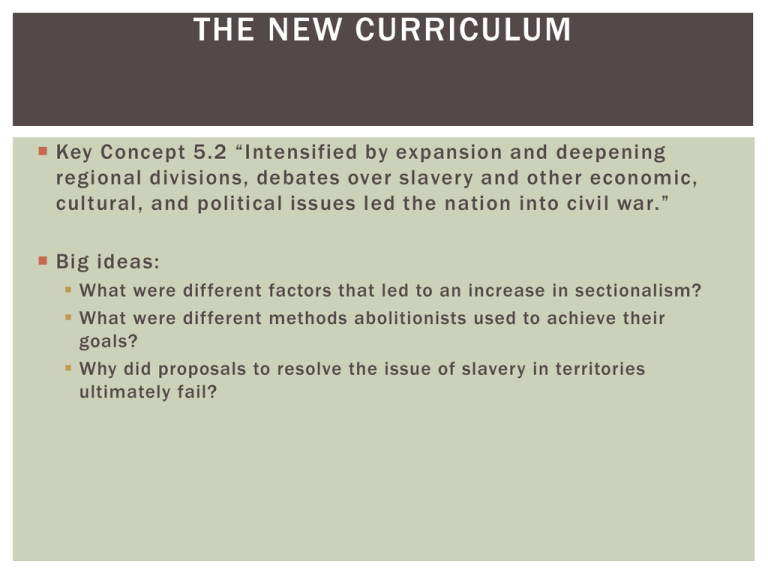
THE NEW CURRICULUM Key Concept 5.2 “Intensified by expansion and deepening regional divisions, debates over slavery and other economic, cultural, and political issues led the nation into civil war.” Big ideas: What were different factors that led to an increase in sectionalism? What were different methods abolitionists used to achieve their goals? Why did proposals to resolve the issue of slavery in territories ultimately fail? KEY CONCEPT 5.2 I Northern v. Southern economies: North: Manufacturing – use of free labor Population grew rapidly - immigration South: More reliant on agriculture and slavery Slow population growth Abolitionism: Minority in the North Very noticeable campaign William Lloyd Garrison’s Liberator called for the IMMEDIATE end to slavery Underground RR helped slaves escape – 1,000/ year Some used violence to achieve goals: Nat Turner’s Rebellion David Walker’s Appeal John Brown’s Raid KEY CONCEPT 5.2 I CONTINUED Many in the South defended slavery as a positive good John C. Calhoun Arguments used to defend slavery: States’ Rights: States could create laws to determine what’s in their own best interest Nullification: VA and KY Resolutions, SC Exposition and Protest – belief that states could nullify (void) federal laws Racist Stereotypes: Minstrel Shows: White actors used blackface in shows that promoted racism and stereotypes “Jim Crow” was a major character KEY CONCEPT 5.2 II Proposals to resolve the issue of slavery that ultimately failed to reduce tensions: Compromise of 1850: Major Parts: 1. 2. 3. 4. CA was added as a free state Tips the balance in favor of free states Slave Trade was abolished in DC Slavery remained, just not the trade Popular Sovereignty in land gained from Mexican Session Those living in territories could decide status of slavery More strict Fugitive Slave Act – will infuriate Northerners Requires Northerners to aid in catching and return of slaves Leads to Personal Liberty Laws Kansas-Nebraska Act: 1854 Law that allowed for popular sovereignty in the Kansas and Nebraska Territories The expectation was that Kansas would be slave, Nebraska would be free Overturned the Missouri Compromise Many in the North were upset Helped lead to the creation of the Republican Party KEY CONCEPT 5.2 II CONTINUED Proposals to resolve the issue of slavery that ultimately failed to reduce tensions: Dred Scott v. Sanford: 1. 2. 3. African Americans (regardless if they were free or slave) were NOT citizens and could not sue in court Slaves were considered property and could not be taken away without “due process” (5 th amendment) Congress could not regulate slavery in territories Tensions between the North and South increase Democratic Party splits along sectional lines The end of the Second Party System was caused by: Issues of slavery and nativism -> helped lead to sectional parties (see election of 1860) Republican Party emerged in the North and Midwest: Made up of Free-Soilers and some former Whigs Lincoln’s Presidential Platform in 1860 was the NONEXTENSION of slavery Ultimately, this would lead to many southern states seceding, causing the Civil War








